

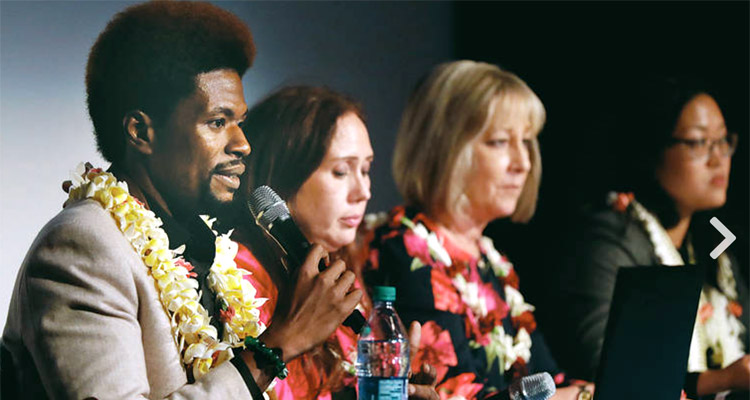
Amir Whitaker, left, ACLU of Southern California; Darcia Forester, Hawai'i Public Defenders Office; Heidi Armstrong, Hawai'i DOE; Rae Shih, panel moderator. Jamm Aquino photo
OPEN LETTER TO Amir Whitaker, ACLU of Southern California
Darcia Forester, deputy public defender, Hawai'i Public Defenders Office
Heidi Armstrong, assistant superintendent, Hawai'i Department of Education
Susan Essoyan, Star Advertiser: sessoyan@staradvertiser.com
Raquel Reedy, Superintendent, Albuquerque Public Schools: reedy@aps.edu
A debate has raged for over a decade on mainland about the increasing presence of School Resource Officers (SROs). School-based policing is considered one of the fastest growing areas of law enforcement.
Our schools, like our communities, are no longer innocent. In part because of mass shootings, in part due the drug war against Americans, many people — including President Trump — believe there should be armed SROs inside every school.
Adocates believe SROs can best handle any threats at schools. Critics say their presence creates unintended consequences like suspensions, expulsions and arrests — especially for students of color. The ACLU is in the latter group. Both parties are wrong — for Hawai'i and America.
The ACLU and other liberal groups claim America is defined by "institutional racism." The point to programs, such as Bill Clinton's and Joe Biden's 1993 "Get Tough on Crime" legislation. These leaders weren't racist; but the unintended consequences of their upgrade to the drug war against Americans certainly was.
ALL of America has misread the data concerning Black vs. White race relations. Certainly there are pockets of institutional racism. In our rush to condemn White America for the Greatest Sin of America, we failed to notice the larger concern in Institutional Defiance.
I am Ko'olau of Kaua'i — The Defiant One. I will explain Institutional Defiance later.
The ACLU claims Hawai'i suspends a lower percentage of its public school students than the national norm, but students are put out of school for much longer.
This is an uneducated statement and the ACLU civil rights attorney paints a grossly inaccurate picture about Hawaii's system. To understand school suspension, you need an educational expert. In grad school, the National Center for Education Research (NCER) recruited me. I was interested in their rigorous research programs; not excited about living in Washington, D.C.
The NCES sought me because I am a third-generation teacher and know a bit about education. My grandfather on my dad's side taught high school and was a university professor. My grandmother on my mother's side taught elementary 4th through 6th grades.
My mom spent her career teaching first grade in an underprivileged school with predominately Black poor students. She brought many home to provide additional care. She ensured they got decent meals, cut their nappy hair, and purchased a second-hand sewing machine so she could make them clothes. She solicited and earned federal grants to start our commmunity's first Head Start and Follow Through programs. She's an education hero. I also grew up of mixed ethnicity: my White classmates considered me an "inside-out Oreo."
My father started as a biology teacher and coach; became a counselor working with troubled boys; and finished his career as the top high school principal in the state. He inspired his kids, as well as teachers and students, to be the Best They Could Be — his leadership created an Idaho Punahou.
I taught many subjects and grades — working as a part-time and substitute teacher. The district used me heavily in their alternative school, as I displayed an aptitude for succeeding with troubled students — primarily boys. Public education is currently failing boys, which I will discuss later.
My final year of teaching was with Del Norte high school, part of Albuquerque Public Schools, in 2001. The district hired me a couple weeks late into the school year, as they couldn't find Special Ed Behavior Development (BD) instructors. I had to walk my paperwork through the bureaucracy and hand-deliver the completed packet to APS officials. The relevance of this will be clear in a moment.
Head teacher Mike provided the basic principles. Students started with no privileges and earned more as they passed assigned behavioral steps. I threw this out the second day. I started all my students at the top — and worked to teach them how to aspire for even more.
You can't expect students to be the Best and Brightest if you start by telling them they are nothings. That's the miliary way; not Coach Wooden's way.
At the end of my first week, a very successful week, Andrew and Jessica remained after school for a few minutes. My two 15-year-old sophomores were curious. Andrew was a good kid overall. He simply didn't like being told what to do and rebelled frequently. Public education here and mainland does not tolerate defiance from students.
Jessica was smart and adorable. She didn't fit the traditional BD mold. She had tried to kill herself the previous year after losing both her parents in a car accident. She was BD, as she was fragile emotionally.
I treated them differently than had past teachers. Andrew told me, "You won't be here long." I disagreed. I'm not a quitter. "I'll be here." He said I wouldn't. "They don't keep teachers like you. You care!"
Andrew's words haunt me still today. APS proved him correct in mid-November.
About the first of November, an aide arrived to summon me to the office. She instructed me to bring Darryl to the vice principal's office. No further information.
When I arrived, I saw Jessica crying profusely in the corner. She was the only female with three male administrators in the small room. Counting myself and Darryl, there were five males and one sobbing female.
In my presence, the three top administrators called Jessica a "ho" and other negative labels. She had been holding hands with Darryl at lunch. He was in the BD program because he sold pakalolo and other illicit drugs. He bragged about it. Wouldn't be 18 until January. Every administrator knew. His family was poor. They used him to front their deals. It was how they survived financially.
Nothing the school could do; Albuquerque police couldn't arrest him on statements. They knew he was dealing; couldn't prove it. The administrators wanted to shame Jessica away from him. I was shocked. They hadn't discussed this with me. They could also trigger another suicide attempt (or success).
After the meeting, I met with our woman's counselor. She was furious. She asked me to report the incident to our female principal, Becky Altmeter.
I did. Wrote up a complaint. Hand-delivered to Becky. APS fired me two weeks later. The APS HR director told me my paper was incomplete and #TimesUp. I had challenged the kings. Public education does not tolerate defiance in their ranks.
I wrote to current APS superintendent, Raquel Reedy, about this a year ago. She ignored me. I applied for a position with her office having top qualifications and excellent recommendations. Didn't get an interview. The district still considers me a trouble-maker. Guess I've always been Ko'olau — the Defiant One.
The ACLU's Report is fundamentally flawed. It takes public education in Hawai'i backward and it is destructive. Chart A below shows students with the highest number of days suspended are those with a disability. We're not talking about blind or deaf students. These are BD students like the ones I taught — many are defiant students.
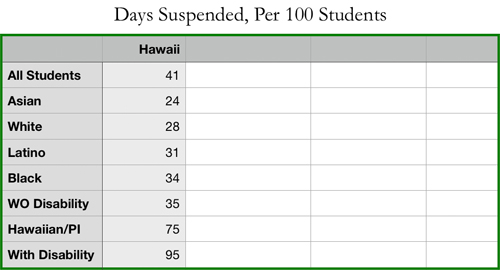
Chart A
They have behavioral problems. They get into fights, intimidate, maybe bring weapons — promote or use illicit substances. The ACLU talks about a "School-to-Prison Pipeline." They're already in the pipe. In general, they shouldn't be in our public schools. Educators aren't equipped to manage these students. Society throws their "unwanted problems" on administrators and teachers.
Statewide the two most common offenses leading to suspension are drug violations and harassment, according to Mel Decasa, federal compliance lead for the Department of Education's Data Governance section. Students can be suspended for "reasonably appearing to be under the influence of a drug — and that includes tobacco or vaping on campus."
Administrators and teachers are doing their jobs — as the public demands — to discipline students, reduce unacceptable behavior, and maintain a safe and productive learning environment.
The ACLU wants administrators and teachers to do more by managing bullies, sexual abusers and drug dealers on our middle and high school campuses, while state legislators and the public continue to limit the resources needed to handle such assignments.
Look more closely at suspension rates. The ACLU says there are a lot of hot spots where children are being "deprived of their educational opportunties." As part of my ELS (English Second Language) training program, I wrote about my 15-year-old student Andrew and his pattern of defiance. He didn't want educational opportunites. School wasn't useful to him. He saw no value and was committed to "being the best bad kid he could be."
"You see a lot of hot spots. Those are not volcanoes erupting. They are children being deprived of their educational opportunities."
The ACLU report compares the Percentage of Students Suspended in academic year 2015-16 for Hawai'i and the nation. Hawai'i bests the nation:
Hawai'i is nearly double the nation when comparing Days Suspended, per 100 students:
U.S. Department of Education Civil Rights Data Collection, 2015-16 academic year.
The ACLU's report is extremely unprofessional. This is only ONE YEAR of educational data. A sophisticated research team would use at least ten years of data. This would provide more accurate "averages" and allow for trend analysis. For example, are the number of suspension days going up or down?
Principal Amy Martinson, Highlands Intermediate, pointed out the 2015-16 school year (data used for this research) included a high number of suspension days, as administrators had busted a group of students selling marijuana on campus.
"That year was a really crazy anomaly. Wasnt many students, but they were long suspensions ... anywhere from 45 to 92 days. I took into consideration the severity of the offense.
I have an obligation to the rest of my student population because the parents want a safe environment, drug-free."
Principal Martinson added the school's suspension average is generally "very, very low" because the school has internal support programs. Students can attend behavior modification courses instead of being suspended. Students receive tutoring all day by regular teachers.
ACLU did not account for either the anomolous year or the schools alternative to suspension program. Media and the public criticize public educators — for leading our keiki correctly — and as we want.
Chart A above is what we consider in statistics as a simple cross tabulation or CrossTab. It provides an limited view of the data and generally should not be used to draw conclusions. Mr. Whitaker would have benefited being in my University of New Mexico course I taught covering applied statistics and research methods for public policy.
Informally, I asked a local expert some questions. Thinking about Asian students, what grade do you expect them to earn on average? I did this for all ethnic groups and recorded her responses below in Chart B.
As she is familiar with local culture, I asked how many books she expected to find in the homes for each ethnic group using the options: Many, Some or Few. I recorded here responses in Chart B below.
I then asked what percentage of boys she would expect to find in detention relative to girls. She didn't believe there would be a difference in ethnicity — but expected about 80 percent of suspensions to be assigned to boys.
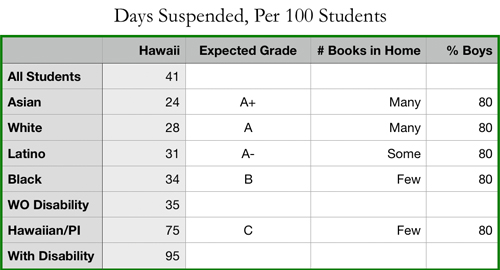
Chart B
She was unaware the pupose of my questions. Her expected grades were inversely and tightly correlated with number of days suspension: lower suspension led to higher grades. And, her perception of books in the home correlated positively to higher grades: more books equalled higher grades.
Most of us support these conclusions.
Raised by a first grade teacher, I excelled in reading. Started school at five, as I was ahead of my peers. My sister didn't attend first grade at all. She started in second. My mother knew "Reading Was Fundamental." We didn't simply have books in our home. She made us read and required us read outloud to her.
I used # of Books as an example. Hawaiians do not read alot. Their families do not emphasize reading. They tend to be a highly verbal culture. There is nothing wrong with this — but they will likely struggle in public school, as programming requires a great deal of independent reading.
If a student struggles in school, especially from the start, they are likely to end up in behavioral programs. They are more likely to be suspended in early grades.
As Andrew taught me, he was labeled defiant early and his reputation proceeded him in subsequent years. Thus, he mastered being the best bad kid he could be. He was in the pipeline because he started school reading poorly. Unable to catch up, he excelled at defying authority and behaving kolohe.
The ACLU claims more suspension leads to less learning opportunity. Obviously, on the surface, if a youngster isn't in school, there is less opportunity to learn. But one assumes the student (1) wants to learn when he is in school, and (2) is capable of learning at the assigned grade level. The ACLU's fancy Tableau report does not address either of these factors.
The ACLU claims Institutional Racism — making this a divisive ethnic issue and criminal justice focus. Their assumptions are wrong and conclusions destructive to our state and 'Ohana.
I counter the ACLU's simple claim arguing less quality reading in the home, especially in early, formative years, leads to more suspension later. I reverse the ACLU's model. Teach our keiki to read well at 4- and 5-years of age and they will be more successful in school. Success in school makes learning more enjoyable — students who find school rewarding are less defiant. Experts are nearly unanimous on this point.
The ACLU also provided national averages for days suspended concerning each ethnic group as shown in Chart C below. As expected, students with a disability, i.e., Behavior Development, have high rates of suspension. In national data, Black students suffer the highest number. In Hawai'i, it was Hawaiians and Pacific Islanders. What do these groups have in common?
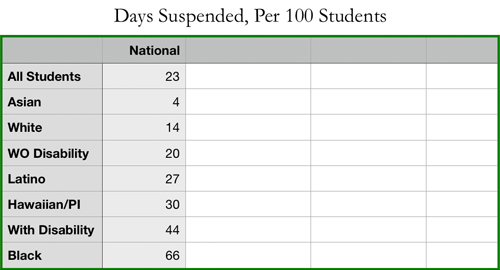
Chart C
African Americans were enslaved, suffered Jim Crow, and clearly deal with instances of racism today. The U.S. government overthrew the Hawaiian monarchy in 1893 by imprisoning Queen Lili'uokalani in the 'Iolani Palace. Both groups justly consider themselves oppressed minorities. They are defiant.
Neither group identify highly with the language of White culture. Native Hawaiians proudly prefer pidgen; Black groups further ebonics. There are other social-economic factors the groups share, such as lower standard of living and less formal education. These effect public school performance.
Most importantly, both groups openly defy White culture — and thus, White authority. As my mother knew, even her first grade Black students were more defiant in the classroom, as they routinely "talked back to her." Growing up, Black athletes were more defiant about grooming rules — having more facial hair, of which primarily White coaches disapproved at the time.
I was raised on the Black comedy of Richard Pryor. Count the number of times he says, "MotherFucker." White culture hates this term. This is why he says it.
Richard is defiant; he teaches Black people, primariy males, to be defiant. Research groups do not understand this, as they tend to be of the majority culture.
Stronger attitudes of defiance with fewer tools to navigate the road to success in public school leads to greater days of suspension.
The working hypothesis of the ACLU and liberal groups is unjust discipline, overly-harsh penalites — including suspension, and racially-unequal enforcement block minority students from educational opportunties. Thus, they demand suspension be limited or ended all together.
I have challenged their hypothesis. I certainly do not advocate any student being denied educational opportunity. Yet it is established BD students, for example, engage in fighting, intimidation, and drug dealing on our campuses. Administrators and teachers need punitive tools to ensure other students are safe.
"A lot of jurisdictions have eliminated out-of-school suspensions or capped them at 10 days."
Jurisdictions than have eliminated out-of-school suspensions or capped them now force teachers and administrators to become disciplinarians, rather than focusing on their primary mission — educating our youngsters.
We must first recognize and acknowledge the existence of Institutioal Defiance in our society — particularly from boys. In my work with Albuquerque Public Schools last year, I pointed out to Superintendent Reedy nearly 100 percent of teachers, resource staff and administrators in primary schools were female.
They set different expectations on boys than do men. I believe this contributes to the School Pipeline. What might have been "boys are just being boys" a generation ago could be an arrest today.
Young Andrew received his negative moniker in primary school. Middle school teachers expected him to be defiant and a trouble-maker. I was one of the first teachers to clear his slate.
Highlands Middle School recorded the highest number of suspensions in school year 2015-2016. Here's the MATE Underwater Robotics team. Traditionally, a field such as robotics would garner much male interest. Of the eight, only two are boys.

Robotics Team: only 2 of 8 are Boys
Here's a photo of the Highlands Middle School 60th Hawaii State Science and Engineering Fair Results. A generation or two ago, this likely would have been all male. Now only two students are boys.

Science and Engineering Fair: only 2 of 12 are Boys
Society would hope Highlands Middle School Student Activites are gender balanced. There are twenty students and only six are boys.

Student Activities: only 6 of 20 are Boys
The pattern in clear. Successful teams and school groups are dominated by young ladies. Suspended students are more likely to be male. We may have pushed the pendulum to far. We need to be paying attention to both boys and girls equally. Our prisons are about 90 percent male.
In Hawaii, Principal Martinson said police officers, not principals, determine whether to charge a student with a crime. The ACLU criticizes this approach. There are hundreds of principals in our islands. If they set the penalties, there will likely be greater variation in disciplne and punishment — far more subjective.
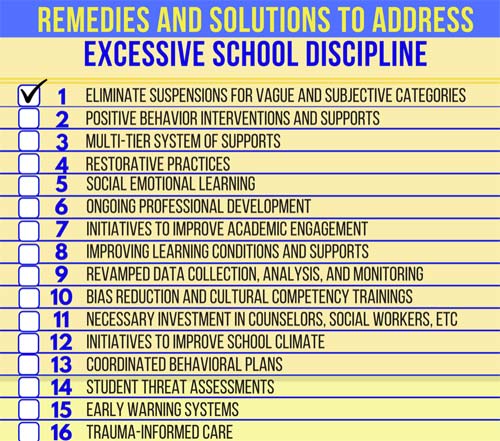
Administrators are educators, not prosecuting attorneys and judges. Police are more likely to be objective and consistent. The ACLU demand is ill-advised.
"If you are a juvenile and you are being arrested in school, you are handcuffed, there is a blue-and-white that is ready to receive you and you are taken to a police station. Your parent is not in that car.
It doesn't matter how nice or kind the officer may be. The trauma of being handcuffed and taken to a police station like a criminal has long- standing impacts, especially if it's a minor offense or if you’re not guilty."
Darcia Forestor, deputy public defender, abhors the arrest process. It is clearly traumatic. A generation ago, this policy was preferred. Administrators and police referred to the methodology as "Scared Straight." They hoped to teach young defiant students, primarily males, their negative actions led to harsh consequences. Does softening our approach send the most effective message?
I believe there is no disagreement we all want to reduce the School-to-Prison Pipeline funnel. The ACLU claims reduced suspension is the most effective way to do this. As an experienced educator, this simply ties the hands of administrators and teachers. If students do not misbehave, there is no suspension.
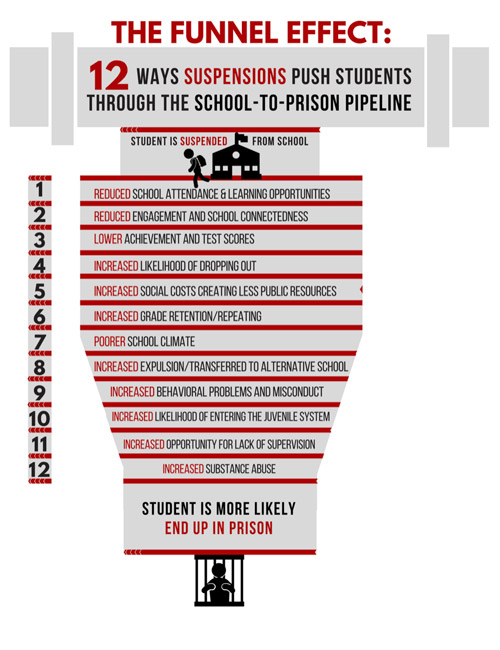
As Principal Martinson pointed out, our schools already offer in-school alternatives to out-of-school suspension. The question for all of us should be: how do we make our schools more rewarding for all our students?
There seems to be hundreds of schools listed in the ACLU online Tableau presentation. One premiere college preparatory academy is missing — Punahou.
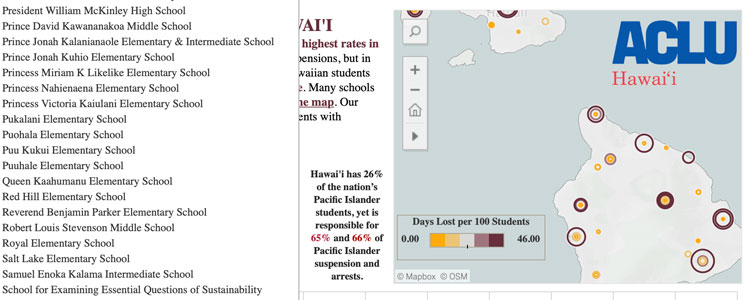
I ask ACLU civil rights attorney, Amir Whitaker, what is the suspension rate at Punahou? If we truly care about equality of education in America, why aren't we collectively working to ensure ALL our keiki have such a wonderful educational opportunity?
By doing this, maybe we would need to worry less about funneling our youngsters into the School-to-Prison Pipeline in the first place. Maybe students would be motivated to learn; excited about their classroom experience; and thankful for the teachers and adminstrators who challenge them each and every day.

I am Ko'olau of Kaua'i — The Defiant One
"I Believe We Can"